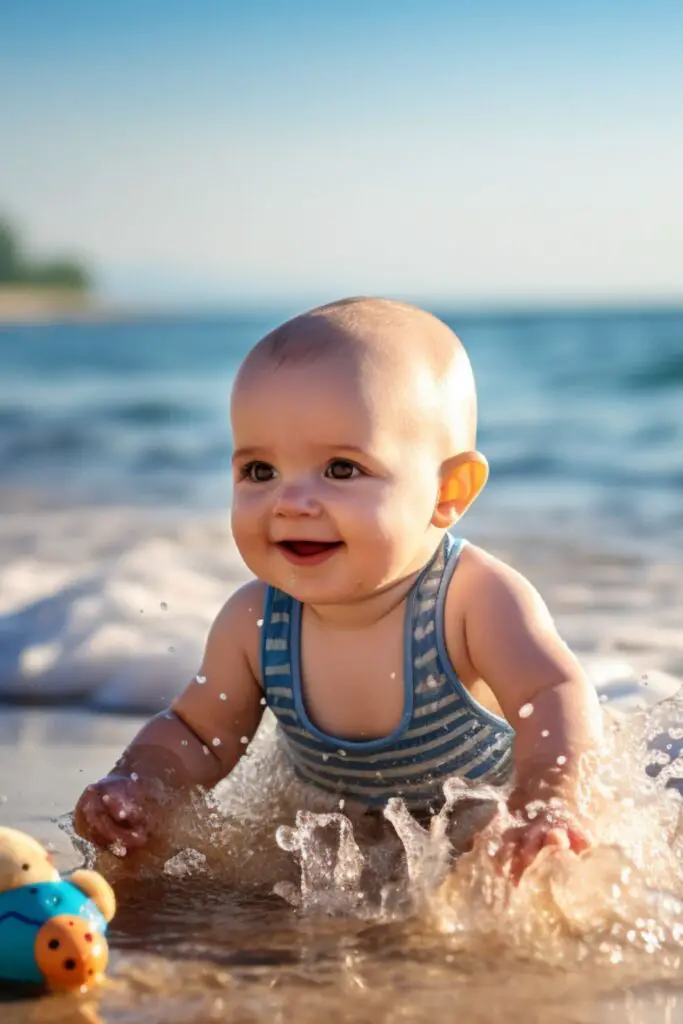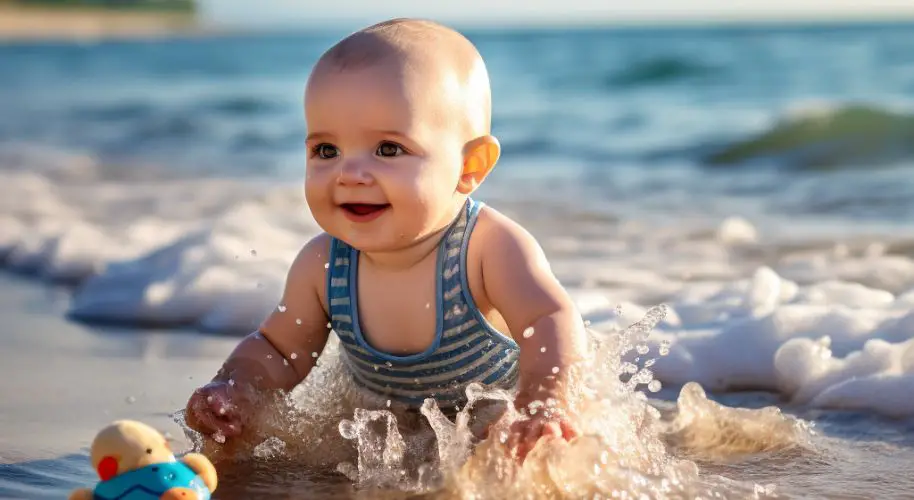Last Updated on June 5, 2025
Taking your newborn to the beach can be a delightful experience, but keeping them cool and comfortable in the heat is crucial. This blog post is dedicated to providing expert advice and tips on keeping your little one cool while enjoying the beach.
Expert pediatrician Dr. Montague says, “You can help keep your baby cool by spraying his hands and feet with water or wiping him with a wet cloth occasionally.” This simple yet effective technique can make a difference in ensuring your baby’s comfort in the summer heat.
So whether it’s your baby’s first trip to the beach or you’re a seasoned parent looking for more tips, this blog post will surely provide valuable information to help you make your beach day with your newborn as enjoyable as possible. Stay tuned for our top tips on how to keep a newborn cool at the beach!

How To Keep A Newborn Cool At The Beach
Taking your newborn to the beach can be a delightful experience, but keeping them cool and protected from the summer heat is crucial. Here are some strategies to ensure your baby stays comfortable:
Lightweight Clothing
Dressing your baby in light, breathable clothing can help regulate their body temperature in hot conditions.
Sun Protection
Wide-brimmed hats and cool baby sunglasses can protect your baby’s eyes and face from the sun. Also, keeping babies under six months out of direct sunlight is essential.
Beach Tent
A beach tent is an excellent option for creating a shaded, protected space for your baby. It can offer a refuge from the wind, act as a barrier to the sand, and serve as a comfortable spot for naps or diaper changes.
Umbrella
An umbrella is an essential item for a beach trip. It provides much-needed shade and protection from the sun’s harmful UV rays, creating a cooler environment for your baby.
Stroller Fan
A portable fan attached to the stroller or baby carrier can offer a gentle breeze to keep your baby cool.
Muslin Blankets
Muslin blankets are lightweight and breathable, perfect for covering your baby without causing overheating. They can also double as nursing covers.
Spray Bottle
A small spray bottle filled with ice water can spray your baby, helping to cool them down. “You can help keep your baby cool by spraying his hands and feet with water or wiping him with a wet cloth occasionally,” says Expert pediatrician Dr. Montague.
Hydration
Keeping your baby hydrated at the beach is critical. You may need to feed your baby more frequently if your baby is breastfeeding. For older babies, bring along small sips of cooled boiled water.
Cold Compresses
Cold compresses can be applied to cool your baby down quickly.
By taking these precautions, you can ensure your newborn stays cool and comfortable at the beach.
You Might also Like These Resources!
- Ensuring Newborn Safety in Swings: Expert Insights
- Are Baby Swings Secure for Newborns?
- Ensuring the Safety of Vibrating Swings for Babies
Choosing the Right Time to Visit the Beach

Choosing the right time to visit the beach can greatly enhance your experience. Here are some factors to consider:
Time of Day
According to various sources, the best time to go to the beach is early morning or the evening12. This is when the sun is less intense, reducing the risk of sunburn and heatstroke.
Day of the Week
Weekdays are less crowded than weekends, making them a better choice if you prefer a quieter beach experience.
Time of Year
The best time to visit the beach generally falls during the warmer months when the weather is sunny, and the water is warm. However, shoulder seasons, i.e., Spring (March to May) and fall (September to November), are also good times to avoid crowds.
Weather and Tides
Check the weather forecast and tide times before heading to the beach. A low tide can reveal rock pools and other interesting features, while a high tide might limit the amount of sandy beach available.
Marine Life Activity
Some beaches are known for specific marine life activities at certain times, such as turtle nesting or whale migrations. Researching these events can add extra excitement to your beach visit.
Remember, safety should always be a priority. Avoid the peak sun hours (10 am – 2 pm) when UV rays are strongest, and supervise children near the water.
What Is A Baby’s Safe Temperature Outside?
The safe outdoor temperature for a baby can vary based on factors such as age, health, and duration of exposure. According to the American Academy of Pediatrics, it is generally safe for a newborn to be outside when temperatures are between -15°F and 90°F. However, it’s crucial to note that while babies can be taken out in these temperatures, extra precautions should be taken against potential risks like hypothermia or heat stroke.
In warmer climates where the temperature rises above 80°F, the risk increases for babies due to their inability to regulate body temperature effectively. Prolonged exposure, especially if the heat index is 90 degrees or higher, can lead to dehydration or overheating.
Therefore, limiting their time outdoors is recommended, keeping them in the shade, dressing them in light clothing, and ensuring they are well hydrated.
In colder climates, babies should wear layers to maintain body warmth. If the temperature drops below 50°F, outdoor exposure should be limited, and the baby should be well bundled up.
FAQs
What should I dress my newborn in at the beach?
Dress your newborn in lightweight, light-colored clothing and a wide-brimmed hat to protect them from the sun.
Is it safe to take my newborn into the ocean?
It’s best to avoid taking your newborn into the ocean due to the risk of drowning and exposure to harsh saltwater.
Is it safe for my newborn to sleep at the beach?
Yes, but ensure they’re in a shaded, cool area and monitor them closely for signs of overheating.
Conclusion
Ensuring your newborn’s comfort and safety at the beach involves careful planning and attention. Dress your baby in lightweight, breathable clothing and protect them from the sun with a hat and sunglasses.
Create a shaded sanctuary using a beach tent or umbrella, and consider using a stroller fan for additional cooling. A spray bottle filled with cold water can be a handy tool for quick cooling, and remember the importance of regular hydration.
Choose the right time for your visit to avoid peak sunlight hours and crowds. As you implement these tips, remember to embrace and enjoy these special moments at the beach with your newborn. These measures will ensure their comfort and safety and make your beach outing a memorable experience.
You Might Also Like These Latest Content!
- Collapsing the Summer 3D Lite Stroller: A How-To Guide
- Folding Up Your Graco High Chair: Easy Steps
- Cleaning Your UPPAbaby Mesa Car Seat


